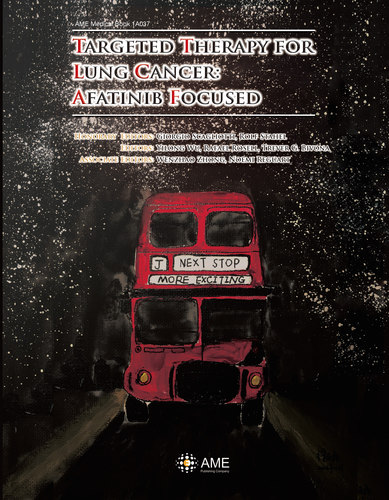
Targeted Therapy for Lung Cancer: Afatinib Focused
| Editors: | Yilong Wu, Rafael Rosell, Trever G. Bivona |
Publisher: AME Publishing Company; 1st edition (2018)
ISBN-13: 978-988-78919-6-3
Hardcover: 364 pages
Language: English
This new book highlights the most relevant cutting-edge advances in one of the 'hot topics' in the field, EGFR-mutant lung cancer. This book has been divided into several sections. The first section namely-EGFR mutation and lung cancer-offers a state of the art overview related to this molecular aberration, describing not only the most common types of EGFR mutations, indels and point mutations, but other less common genomic events such as duplications and rearrangements involving alternative sites of kinase domains. It also addresses current development of molecular assays for somatic mutation testing not only in tissue but by using novel and less invasive techniques that allow DNA mutation detection and monitoring in blood. In the second section HER2-driven NSCLC is the focus of the topic discussing the genetic alterations that are felt to mediate its oncogenic functions in NSCLC, epidemiology and a detailed overview of new investigational anti-HER2 therapies that are currently explored in ongoing clinical trials applied to NSCLC. In the next sections targeted therapies move back into attention addressing areas of huge interest for readers including an up-to-date review of available data from selected pivotal trials with first and second TKIs (focusing on afatinib), as well as an outline of new third generation irreversible and covalent inhibitors with potential to overcome the most frequent cause of acquired resistance related to T790M. This section makes attention to other hot topics in the field such as the controversial role of targeted therapies and immune checkpoint inhibitors with or without radiotherapy in the treatment of brain metastasis. The last chapter outline the topic of acquired resistance in EGFR-mutated NSCLC patients and potential novel strategies to restore the sensitivity with new generation T790M inhibitors. Last but not least a mention to precision medicine, a clear example of implementation and success in lung cancer management.
Honorary Editors
| Giorgio Scagliotti | Medical Oncology, University of Torino, Italy |
| Rolf Stahel | Department of Oncology, University Hospital Zürich, Rämistrasse 100, 8091 Zürich, Switzerland |
Editors
| Yilong Wu | Guangdong Lung Cancer Institute, Guangdong General Hospital & Guangdong Academy of Medical Sciences, Guangzhou, China |
| Rafael Rosell | Catalan Institute of Oncology, Germans Trias i Pujol Health Sciences Institute and Hospital, Badalona, Spain; Oncology Institute Rosell, Quiron-Dexeus University Hospital, Barcelona, Spain |
| Trever G. Bivona | UCSF Helen Diller Family Comprehensive Cancer Center, San Francisco, USA |
Associate Editors
| Wenzhao Zhong | Guangdong Lung Cancer Institute, Guangdong General Hospital & Guangdong Academy of Medical Sciences, Guangzhou, China |
| Noemi Reguart | Consultant Thoracic Oncology, Medical Oncology Department, Hospital Clinic, IDIBAPS, Villarroel 170, 08036, Barcelona, Spain |
Table of Contents
Foreword
Preface
EGFR Mutation and Lung Cancer
1 Tumor heterogeneity: evolution through space and time in EGFR mutant non small cell lung cancer patients
13 EGFR, EGFR TKI, and EMSI: a never-ending story
16 Advances on EGFR mutation for lung cancer
26 Kinase inhibitor-responsive genotypes in EGFR mutated lung adenocarcinomas: moving past common point mutations or indels into uncommon kinase domain duplications and rearrangements
33 Molecular methods for somatic mutation testing in lung adenocarcinoma: EGFR and beyond
49 Circulating DNA in diagnosis and monitoring EGFR gene mutations in advanced non-small cell lung cancer
HER2 and Lung Cancer
63 Targeted therapy in NSCLC driven by HER2 insertions
68 HER2 driven non-small cell lung cancer (NSCLC): potential therapeutic approaches
EGFR Tyrosine Kinase Inhibitors and Lung Cancer
74 Targeted therapy in lung cancer: IPASS and beyond, keeping abreast of the explosion of targeted therapies for lung cancer
90 Irreversible EGFR-TKIs: dreaming perfection
100 Targeted therapy in non-small cell lung cancer: a focus on epidermal growth factor receptor mutations
105 EGFR inhibition and more: a new generation growing up
108 Update on third-generation EGFR tyrosine kinase inhibitors
111 The continuing role of epidermal growth factor receptor tyrosine kinase inhibitors in advanced squamous cell carcinoma of the lung
115 Lung cancer biomarkers, targeted therapies and clinical assays
127 Targeted therapy for non-small cell lung cancer: current standards and the promise of the future
146 Treatment of advanced squamous cell carcinoma of the lung: a review
155 Epidermal growth factor receptor tyrosine kinase inhibitors in non-small cell lung cancer: a decade of progress and hopeful future
158 A potential new therapeutic option for patients with advanced EGFR mutation-positive non-small cell lung cancer in first-line setting
163 Keeping our fingers crossed on 2nd generation EGFR TKIs: is better good enough?
166 Improved overall survival following tyrosine kinase inhibitor (TKI) treatment in NSCLC—are we making progress?
170 Is there a third line option after chemotherapy and TKI failure in advanced non-small cell lung cancer?
173 Is the third generation EGFR TKIs the solution for making EGFR mutant NSCLC a curable disease?
175 Is epidermal growth factor receptor tyrosine kinase inhibitor in combination with cytotoxic chemotherapy a better treatment option for patients with EGFR-mutated non-small-cell lung cancer?
179 Improved overall survival following tyrosine kinase inhibitor treatment in advanced or metastatic non- small-cell lung cancer—the Holy Grail in cancer treatment?
184 Novel radiotherapy approaches for lung cancer: combining radiation therapy with targeted and immunotherapies
EGFR Tyrosine Kinase Inhibitor and Lung Cancer Metastasis
192 Epidermal growth factor receptor tyrosine kinase inhibitors for the treatment of central nervous system metastases from non-small cell lung cancer: the present and the future
208 Are immune checkpoint blockade monoclonal antibodies active against CNS metastases from NSCLC?—current evidence and future perspectives
217 Non-small cell lung cancer (NSCLC) and central nervous system (CNS) metastases: role of tyrosine kinase inhibitors (TKIs) and evidence in favor or against their use with concurrent cranial radiotherapy
228 Metastatic lung cancer in the age of targeted therapy: improving long-term survival
Afatinib and Lung Cancer
232 Afatinib in lung cancer harboring EGFR mutation in the LUX-Lung trials: six plus three is greater than seven?
236 Afatinib in the treatment of squamous non-small cell lung cancer: a new frontier or an old mistake?
241 Afatinib in first-line setting for NSCLC harbouring common EGFR mutations: new light after the preliminary results of LUX-Lung 7?
245 Afatinib as first-line treatment for patients with advanced nonsmall- cell lung cancer harboring EGFR mutations: focus on LUXLung 3 and LUX-Lung 6 phase III trials
247 Afatinib plus chemotherapy versus chemotherapy alone after progression on afatinib: new insights on old question?
252 Is afatinib a treatment option for brain metastases in patients with EGFR mutation-positive non-small cell lung cancer?
257 Afatinib for patients with epidermal growth factor receptor mutation-positive non-small cell lung cancer: clinical implications of the LUX-Lung 7 study
260 Afatinib and gefitinib: a direct comparison
263 Patient reported outcomes from LUX-Lung 3: first-line afatinib is superior to chemotherapy—would patients agree?
EGFR Tyrosine Kinase Inhibitor Resistance Mechanism
266 Known and putative mechanisms of resistance to EGFR targeted therapies in NSCLC patients with EGFR mutations—a review
281 Whacking a mole-cule: clinical activity and mechanisms of resistance to third generation EGFR inhibitors in EGFR mutated lung cancers with EGFR-T790M
288 Treating acquired resistance to EGFR-tyrosine kinase inhibitors: still a work in progress
291 Management of hyperglycemia from epidermal growth factor receptor (EGFR) tyrosine kinase inhibitors (TKIs) targeting T790Mmediated resistance
299 Histopathological transformation to small-cell lung carcinoma in non-small cell lung carcinoma tumors
311 Recent advances in the development of mutant-selective EGFR inhibitors for non-small cell lung cancer patients with EGFR-TKI resistance
313 EGFR mutation heterogeneity and mixed response to EGFR tyrosine kinase inhibitors of non small cell lung cancer: a clue to overcoming resistance
317 Third-generation epidermal growth factor receptor-tyrosine kinase inhibitors in T790M-positive non- small cell lung cancer: review on emerged mechanisms of resistance
Lung Cancer Precision Medicine
331 Molecular testing in lung cancer in the era of precision medicine
341 Precision medicine in lung cancer: the battle continues


